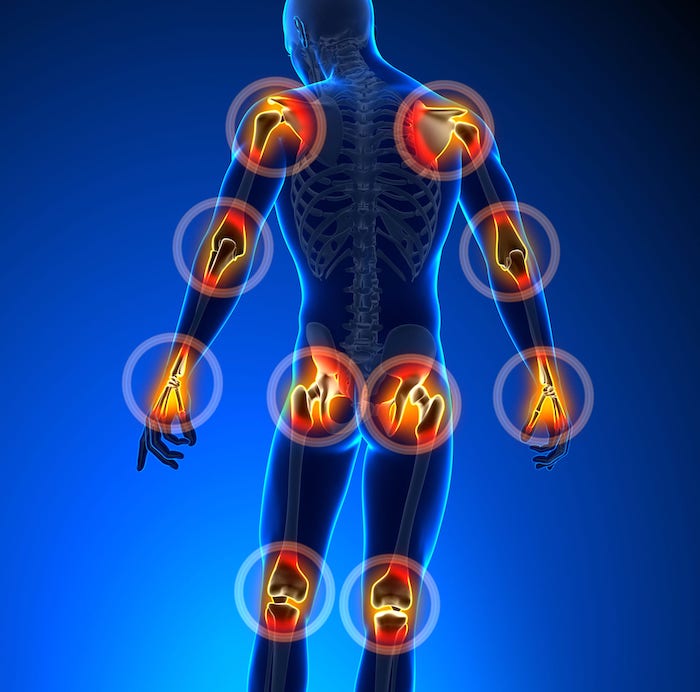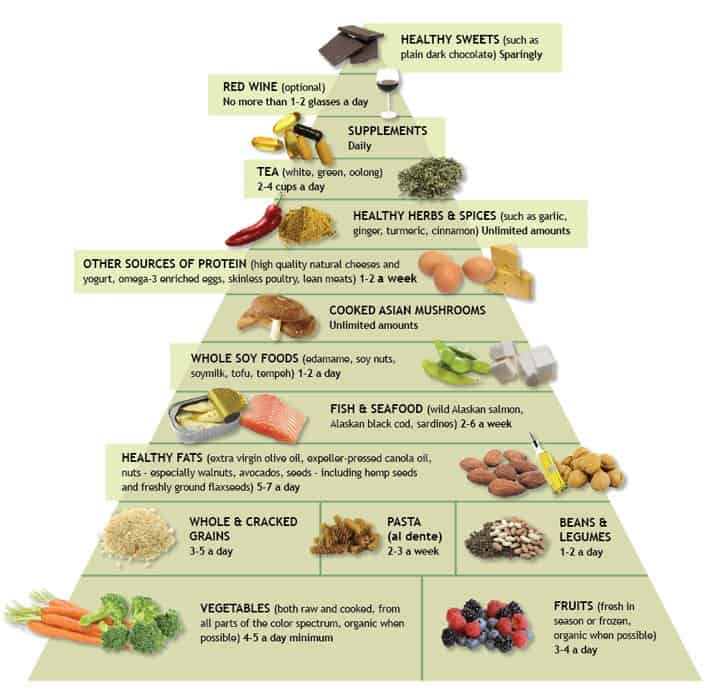Why Common Treatments for Joint Pain May Be Ineffective
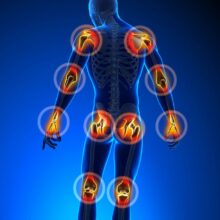
Some common treatments for joint pain may be not only ineffective, but harmful, say some new studies. I review the latest about corticosteroid shots and NSAIDs, and offer some other treatments to relieve arthritis joint pain.
Two new unpublished studies say that patients who got corticosteroid shots in their knees experienced their knee arthritis advance more quickly than those who did not get the shots. This suggests that this very common treatment for joint pain — corticosteriod shots — may be linked to faster arthritis progression.
Moreover, another new study reports that pain relievers like Ibuprofen and Naproxen may worsen arthritis inflammation.
Taken together, this means that the common treatments for joint pain at best might not be effective — and, worse, might actually aggravate arthritis inflammation.
Post Content
Let’s dig in…
What’s Wrong with Coricosteriod Shots?
CBS News reports that two new unpublished studies upend the usefulness of corticosteroid shots to ameliorate knees joint pain. Further, the studies say that knee arthritis might advance more quickly in those that get the shots than for those who did not.
This is a big deal should it prove to be true:
- In the U.S., 24% of all adults (58.5 million people) have arthritis [1].
- Worldwide, more than 350 million people have arthritis [2].
- Approximately 70% of people over the age of 65 have X-ray evidence of osteoarthritis (not all experience symptoms [3].
Arthritis is the swelling and tenderness of one or more joints. The main symptoms of arthritis are joint pain and stiffness, which typically worsen with age. The most common types of arthritis are osteoarthritis and rheumatoid arthritis.
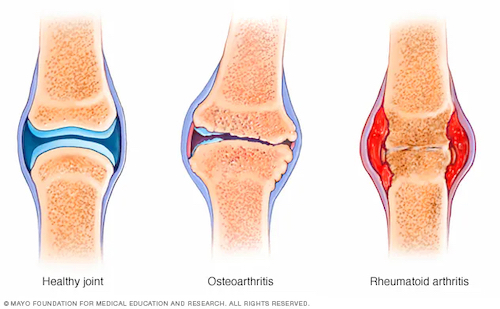
Osteoarthritis, the most common form of arthritis, involves the wearing away of the cartilage that caps the bones in your joints. Rheumatoid arthritis is a disease in which the immune system attacks the joints, beginning with the lining of joints.
Osteoarthritis causes cartilage — the hard, slippery tissue that covers the ends of bones where they form a joint — to break down. Rheumatoid arthritis is a disease in which the immune system attacks the joints, beginning with the lining of joints.
One of the most common treatments for joint due to arthritis are corticosteroid injections, may actually be associated with faster progression of the disease, according to new research.
Osteoarthritis, the most prevalent type of arthritis, occurs when the cartilage that cushions a joint breaks down over time, causing pain and stiffness. This condition most often affects the hands, the hips and the knees. There is no cure yet, but treatments like corticosteroid shots and hyaluronic acid injections are commonly used to provide some pain relief.
Those two unpublished studies was recently presented at the Radiological Society of North America’s annual meeting. Both studies were small and have yet to be affirmed by other labs, but they found that on average knee arthritis advanced more quickly among patients who got corticosteroid injections than those who did not.
It was the opposite with hyaluronic acid — those who were injected with that had slower progression of the disease relative to a control group.
The first study assessed 50 patients each, one group receiving corticosteriod shots and the other getting hyaluronic shots. (The third group of 50 was the control.) The study lasted for four years and revealed worse arthritis progression among participants injected with corticosteroids compared to the other two groups (hyaluronic acid and control).
The second study examined MRI scans from 210 participants, 44 of whom received corticosteroid shots and 26 of whom got hyaluronic acid. The findings corresponded to the first study: More severe cartilage deterioration by the corticosteriod group.
A 2019 report supports the findings of the two studies just summarized. It said that corticosteroid shots in the hips and the knees could accelerate arthritis and the condition and even advance the need for joint replacement operations.
That said, prior research on this subject is mixed. A 2021 analysis found a similar progression of arthritis among those who got steroids and those who got hyaluronic acid.
As Dr. Jonathan Samuels, a rheumatologist at NYU Langone Health, said, it’s tough to determine causation in studies like these, because many factors can influence the progression of arthritis, and no two patients are the same.
I think that the bottom line is to double check with your doctor should you be getting corticosteroid shots, perhaps asking for hyaluronic acid injections instead, or try some of the common treatments for joint pain that I cover below.
Just as with corticosteroid, perhaps you shouldn’t rely on Ibuprofen and Naproxen.
How Can Ibuprofen and Naproxen Worsen Arthritis Inflammation?
Ibuprofen and Naproxen are anti-inflammatory pain relievers, and belong to a category of non-steroidal anti-inflammatory drugs called NSAIDs. They are common treatments for joint pain and osteoarthritis, but they too have recently been singled out as compounds that may gradually worsen inflammation in the knee joints, reports a review of a recent study that made that conclusion.
The cartilage that cushions the joint gradually wears away in people with osteoarthritis, which is why this degenerative joint disease is sometimes referred to as “wear and tear” arthritis. Arthritis is often accompanied by inflammation, or swelling, of the joint (“synovitis“), and that can make it painful.
The study in question set out to analyze whether NSAID treatment influences the development or progression of synovitis, and to investigate whether cartilage imaging biomarkers — which reflect changes in osteoarthritis — are impacted by NSAID treatment.
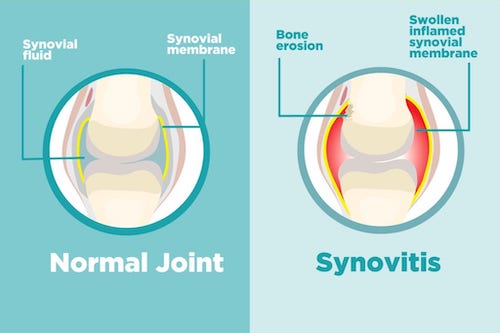
Synovitis is the medical term for inflammation of the synovial membrane. This is a connective tissue disease that results in inflammation located in synovial membrane that lines a synovial joint which causes pain and swelling
The study evaluated 277 participants from the Osteoarthritis Initiative cohort that had moderate to severe osteoarthritis and sustained NSAID treatment. This group was compared with a group of 793 control participants who were not treated with NSAIDs. Both groupds underwent 3T MRI of the knee initially and after four years. Images were scored for biomarkers of inflammation. Cartilage thickness, its composition, and other MRI measurements served as biomarkers for evaluating arthritis progression.
The results showed no long-term benefit of NSAID use. Joint inflammation and cartilage quality were worse at baseline in the participants taking NSAIDs, compared to the control group, and worsened at four-year follow-up.
According to Dr. Johanna Luitjens, lead researcher of the study, there are several possible reasons why NSAID use increases synovitis:
“On the one hand, the anti-inflammatory effect that normally comes from NSAIDs may not effectively prevent synovitis, with progressive degenerative change resulting in worsening of synovitis over time. On the other hand, patients who have synovitis and are taking pain-relieving medications may be physically more active due to pain relief, which could potentially lead to worsening of synovitis, although we adjusted for physical activity in our model.”
Like many studies, this one is not conclusive, leading Dr. Luitjens to opine that prospective, randomized studies should be performed in the future to provide conclusive evidence of the anti-inflammatory impact of NSAIDs.
I think the bottom line here is to beware of over-using NSAIDs.
What follows are more benign common treatments for joint pain.
Common Treatments for Joint Pain that Do Work (at least temporarily)
I want to quickly review three categories of common treatments for joint pain that do not have reported deleterious effects:
- Hot and cold compress,
- Mobility exercises, and
- Food and supplements.
Hot and Cold Compress
The popular, folksy YouTube physical therapists, “Bob and Brad”, addressed the benefits of using various kinds of hot and cold compresses to relieve arthritis pain. (Video below.)
They recommended either hot or cold compresses, depending on your preference.
Hot compress helps dilate the vessels and increase circulation (blood flow):
- For hand arthritis, rinse hands under warm water
- Use a reusable hot/cold compress
- Use an electric hot pad (20 minutes max)
- Infrared therapy pads (delivers heat deep into tissues; 45 minutes max)
Mobility Exercises
You heard from two physical therapists above, now tune into what two surgeons (Drs. Paul Zalzal and Brad Weening) have to say to improve arthritis pain and discomfort.
Their advice distills down to:
- Be active, but not with joint-pounding exercises and movements
- Cycling and swimming are ideal
- Don’t be overweight (more plant food, and less food overall)
Since I’ve been mostly talking about arthritic knees, here’s physical therapist Dr. Kriste Ennis showing you how to help increase range of motion, fluid movement, and strength of your knees:
YouTube is a good source of “how to” videos. If you have arthritis in other areas of your body besides knees, YouTube has plenty of experts to help you out.
Foods and Supplements
The foods that can help with arthritis as the foods that are anti-inflammatory. Dr. Andrew Weil created a pyramid of such foods:
For more about this, read my post: Why Dr. Weil’s Anti-Inflammatory Food Pyramid May Be The Best Diet.
Eliminate these inflammatory foods:
- Sugars
- Soda
- Processed foods
- Processed meats
- Dairy
- Gluten
- Caffeine
- Trans fats
- Simple/refined carbs
- Lard
- Corn and soybean oils
- Pasteurized dairy
- Deli meat or meat from animals fed hormones and antibiotics
Eat these anti-inflammatory foods:
- Salmon
- Anchovies
- Sardines
- Mackerel
- Chia seeds
- Flax seeds
- Hemp seeds
- Walnuts
- Kale
- Spinach
- Swiss Chard
- Water Cress
- Cilantro
- Beets
- Berries
- Mushrooms
- Garlic
- Raw tomatoes
- Tart cherry juice
- Kimchi
- Kombucha
- Sauerkraut
- Miso
- Keifer
As I wrote here, three adaptogens that can help you reduce chronic inflammation are:
- Red ginseng,
- Ashwagandha, and
- Rhodiola.
[Click on images for more info.]
Adaptogens are natural substances, typically herbs, that work as stress response modifiers. They act to reduce the stress response and return systems back to “normal”. Research shows that stress can cause inflammation in the body [4].
Beat Inflammation with these Supplements
- Curcumin — It’s a compound found in tumeric and is an even more potent anti-inflammatory agent.
- Ginger — According to a PubMed, “The anti-inflammatory properties of ginger have been known and valued for centuries…” Ginger has anti-inflammatory phytonutrients known as gingerols that have been used in traditional medicine as a painkiller for arthritis and other inflammatory disorders.
- Cayenne — Contains an active ingredient called capsaicin, which is known in some cultures as a “destroyer of inflammation”.
- Hyaluronic Acid — yes, you can take this as a supplement. A study entitled Oral hyaluronan relieves knee pain: a review concluded: “[Hyaluronic acid] supplements provide at least some possibility for the treatment and prevention of serious conditions in patients with OA [osteoarthritis] exhibiting mild knee pain.”
Mushroom extracts can also have reduce chronic inflammation.
This study makes a strong case for the medicinal effects of mushrooms, stating that they “include anti-inflammatory effects, with anti-inflammatory compounds of mushrooms comprising a highly diversified group in terms of their chemical structure. They include polysaccharides, terpenoids, phenolic compounds, and many other low molecular weight molecules.
Renown mushroom expert Paul Stamets says that the turkey tail mushroom suppresses inflammatory response, enhances the microbiome, and may be a powerful adjunct cancer therapy. “We think it decloaks cancers for discovery by the immune system,” he said. This is his brand:
Primal Herb adds Chaga, Maitake and Reishi to the inflammation fighting list of medicinal mushrooms.
Lastly, I want to give a shout out to a Subscriber named Andrea who told me that she’s getting real relief from Inflamma-Less, a product by Irwin Naturals. Given that this product’s list of ingredients are among those known to reduce chronic inflammation, I’m including it in the mix:
Last Updated on December 3, 2022 by Joe Garma

